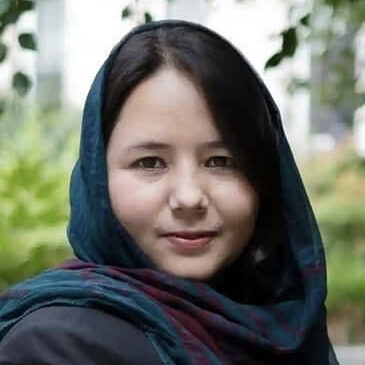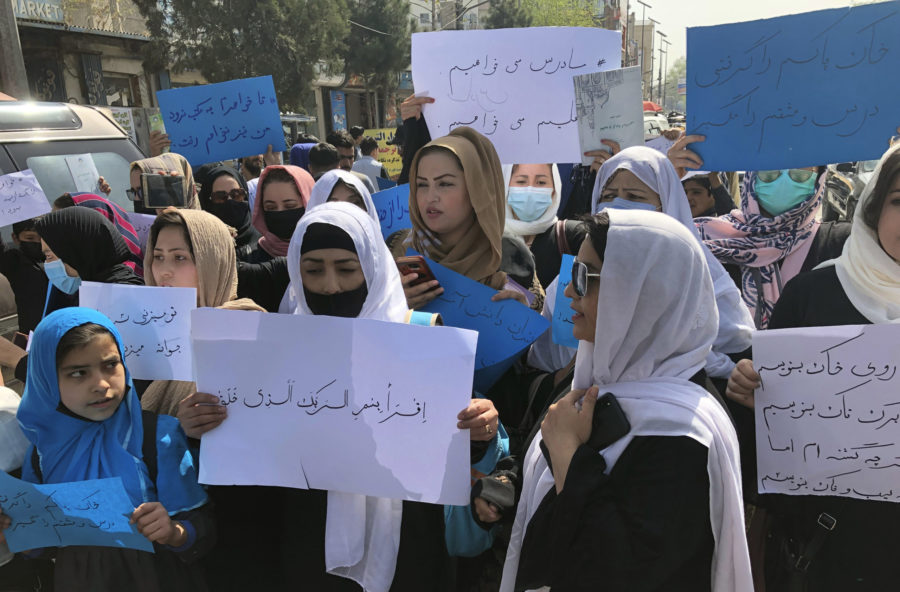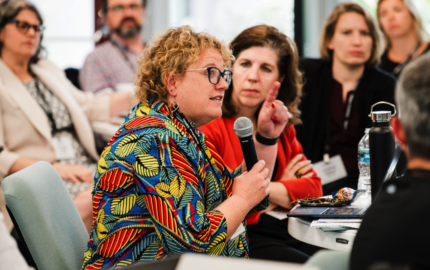In April, Nieman Fellows from the class of 2022 honored Rukhshana Media, an online news outlet in Afghanistan, with the Louis M. Lyons Award for Conscience and Integrity in Journalism. Founded by Zahra Joya in 2020, Rukhshana Media centers the experiences of women throughout Afghanistan, reporting on “the difficulty of gaining inclusion in a society [where] religious conservatism and patriarchy have ruled all aspects of social life.” Through a team of mostly female reporters, Rukhshana publishes stories on a number of women’s issues, including child marriage, gender violence, economic hardship, and street harassment. The work of reporting on gender inequality in Afghanistan has become even more important since the Taliban seized power last August, placing women in the country under threat.
Joya spoke with the Nieman Foundation in May about Afghanistan’s media landscape for women journalists, the work and founding of Rukhshana Media, finding hope, and more. Edited excerpts:
On the work of Rukhshana Media
I’m truly honored that our media organization, Rukhshana Media, received a prestigious award from Nieman Foundation at Harvard University. This award encouraged and motivated my team to work very hard for free media and free speech. Thank you so much. It is my honor to be talking to you on behalf of my colleagues at Rukhshana Media.

It is very hard to tell you that, unfortunately, right now, more than 500 media outlets stopped operating since Taliban took power eight months ago. Hundreds of journalists, male and female, lost their jobs. Hundreds of media workers, including myself, fled Afghanistan. Today, my colleagues at Rukhshana Media and as well as my journalist friends at other outlets in Afghanistan, they are working in extremely difficult situations. I never imagined then that one day I [would be] running Rukhshana Media in Taliban‑controlled Afghanistan.
It is a difficult time for all of us. Honestly, when I received the award from Nieman Foundation, I was very proud. It shows solidarity from you, and it is helpful for all of media and journalists in Afghanistan.
Please do not forget Afghanistan and my country that needs to help and support the media journalist.
Rukhshana Media is a women‑led news organization established in November 2020 to cover women’s issues in Afghanistan. Rukhshana Media has been named after a young woman, Rukhshana, who was stoned to death by the Taliban in 2015.
Rukhshana Media tells the story of women from across Afghanistan, from how they’re treated at home [to] their role and position in society. We are publishing in two languages, Persian and English, covering Afghan women’s issues inside and outside of Afghanistan.
On Afghanistan’s media landscape for women journalists
We at Rukhshana Media tell the story of the love, success, and failure of Afghan women from across the country every day. At Rukhshana Media, we tell the stories of the women and girls who are living under a regime of gender apartheid in the 21st century at a time when women can’t even choose their own clothes.
At Rukhshana Media, we want to tell what it means to lose not only your rights, your job, but also your social identity. We do not simply do journalism these days: We are also covering the laws of our own rights, of our own freedoms. It is hard and painful.
One day, we write about girls being deprived from going to school. The next day, about women being banned from sport activities. We report forced marriage, mysterious killings, and the list goes on.
Women journalists are particularly at risk. They are disappearing from Afghan media landscape simply because they are women. I am speaking to you here today as a woman journalist. Although it has never been easy to be a woman and a journalist in Afghanistan, it is now much more difficult to be even an author and a woman in Afghanistan.
Being a journalist is a far‑reaching wish. There are very few female journalists remaining in the country. Taliban have forced them to wear hijab, ban them from appearing on film, and raising their voice on radio from some provinces.
In our small newsroom, we usually listen to women who are telling their horrible stories while crying. When they talked about their lost dreams, they burst into tears.
On becoming a journalist and starting Rukhshana
When I was a child, my father was a prosecutor. Some of the women, they came to our house and asked my father to help them. At that time, I decided to become a lawyer and become a prosecutor like my father and help women.
In 2011 when I started my university lessons, one of my friends was working with one local news agency. She invited me to go with her to her office and see her colleagues. After that, she asked me, “If you want to work with us … let’s start.”[At] that time, there were a lot of the stories from my classmates. They wanted to share, but there wasn’t any platform. I walked the first steps working as a journalist. For three months I just learned. I just wanted to know: How should I interview with people? What [are] the main questions? What is necessary for a journalist?
After that, I started to work. In 2020, I decided to establish Rukhshana with a simple goal: to create a common conversation among Afghan women. Unfortunately, in Afghanistan, the women, they don’t have enough time to talk together and to write about their lives or read about some things.
I asked my friends and female journalists, I want to create an organization — for example, Rukhshana — do you want to join with me? They said yes, we will help you [with] the details and for materials that we will publish for reporting. We started.
At first, our goal was very simple. All our team was female. Unfortunately, after the Taliban came, everything has changed.
On leaving Afghanistan after the fall of Kabul
I want to say that on 15th of August of last year, we [did] not lose only our government. We lost the result of our 20 years of our life. It is never easy.
I left Afghanistan on the 26th of August. I was very heartbroken. It was like a very bad dream. When I came to the airport and I saw there [were] many families, children, old people who are trying to get out from Afghanistan, it was very hard for me.
When I left Afghanistan, we came with an army plane. I tried to look to Kabul for the last time. Unfortunately, there [weren’t] windows, and I can’t say good‑bye to Kabul. I didn’t see the last moment, my beautiful city.
It was very difficult and hard for me, and heartbreaking too. I never imagined in my life one day I should flee my country.
On how international media can support Afghanistan
Our journalists need financial support. Some of them who are living in high risk, they need to get out from Afghanistan. Unfortunately, sometimes we can’t find any way to solve this problem.
After the Ukraine crisis, all of the media and foreign journalists [forgot] Afghanistan. Right now, situations in my country [are getting] worse.
When one group [comes] and takes all of your rights, for example, you can’t speak, you can’t talk, and even you can’t choose your own clothes. I hope international journalists and international media focus on Afghanistan issues and do not forget Afghanistan.
Unfortunately, when the U.S. and foreign soldiers withdrew from Afghanistan, the Western media, especially the U.S., they didn’t have enough stories from Afghanistan. But Afghanistan is full of stories.
Right now, all of the media, they are focusing on the Ukraine crisis. In my country, 36 million people in Afghanistan, they [are] repeatedly ask[ing] the media and journalists to please share our voice to your countries.
On training young journalists for the future
Unfortunately, since August, hundreds of journalists who had a very good experience left Afghanistan. Now, we are facing these problems and we can’t find a journalist who has experience.
In our newsroom at Rukhshana, we work with this young generation of journalists very closely. We want to teach them how you should follow our way, and how you work as a journalist in this time and this moment. Right now, unfortunately in Afghanistan, there is no way to, for example, hold workshops for journalists or fellowships.
Now, some of the journalism students — we published a story about them — they say, “[There] is no way we study journalism because we can’t work as a journalist now. We don’t have a platform now.” Unfortunately, the curriculum of the universities, it is become changed from the Taliban.
On finding hope in reporting on Afghanistan
All of these stories we are publishing, it’s sad. Honestly, I’m not excited for these stories, because in our team meetings, I ask my colleagues, “Please find a very positive story, an energetic story.” They say, “It is not the time that we publish a positive and exciting story.”
When I’ve been in touch with women, they are still hoping for their future, and still they’re protesting against the Taliban. It gives me hope. It’s a very small candle in the darkness. For me, when I see the women who are aware about their lives, and who are asking the Taliban to come and discuss with them, it is very helpful and positive. Still, I’m hoping for the future of Afghanistan.




